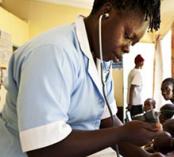
As 2014 comes to an end, the international development community stands on the cusp of major new progress, particularly in global health and development—but the war and disease that marked this year could hinder that progress for decades to come. Health workers labored on the front lines of some of 2014’s most prominent events, which will likely affect global health and the well-being for all 7 billion of us as we move into 2015 and beyond. So let's take a look back at some of 2014’s biggest global health and development stories. Some good, some bad, all illuminating as we enter the new year.
3. War and conflict freeze progress around the world.*
New and ongoing conflicts in 2014 have brought about tragedy and humanitarian crises around the world, including in Syria, Ukraine, Gaza, South Sudan and the Central African Republic. In each of these cases, health workers were among the targeted victims of attack.
The violence and long-term effects of war will linger for decades as countries struggle to rebuild their health systems and other infrastructure.
And as long as the violence persists, so will attacks on those who try to help.
What health workers have to do with it: Attacks on aid workers have spiked over the last two years. According to the International Committee of the Red Cross, local health workers were involved in more than 80 percent of all violent incidents against health care in 2012. From polio vaccine workers in Pakistan to doctors and nurses struggling to contain Ebola in West Africa, health workers often put their lives on the line to provide care.
“Not a day goes by without news of a hospital attacked,” Stéphane Bonamy of the International Committee of the Red Cross said last month. “The fact that health care is targeted is increasingly perceived as a way to deprive the enemy of its resources — this denies the human character of the wounded and the capacity of medical staff to provide impartial care.”
The Safeguarding Health in Conflict Coalition is a group of international nongovernmental organizations that work to protect health workers and prevent attacks on them and their facilities. Not only do health workers have the right to safe working conditions, but they also need them to do their jobs; it’s next to impossible to provide good care when you’re scared, threatened, or injured. And communities need health workers more than ever during times of violence.
* This post originally appeared on Devex. Read the original post to learn about the other top global health stories highlighted. Photo by Trevor Snapp, courtesy of IntraHealth International.
Margarite Nathe is senior editor and writer at IntraHealth International, which is a steering committee member of the Safeguarding Health in Conflict Coalition.

